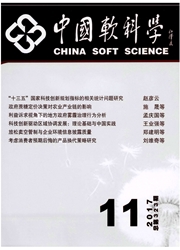

 中文摘要:
中文摘要:
根据补偿变量思想,构建了主产区农户福利效应面板数据模型。在此基础上,利用1989年-2014年主产区省际面板数据,考察了粮食价格波动对主产区农户生产福利、消费福利以及总福利变化的影响。结果表明,主产区各省的粮食消费价值占生活消费支出的比值(CR)总体呈现递减趋势,粮食生产价值占总收入的比值(PR)和粮食生产净收益率(NBR)存在较大的异质性;粮食生产价格变化影响着农户生产福利同方向变化,粮食零售价格变化影响着农户消费福利反方向变化,但变化幅度存在明显的省际差异;财政支农水平的提高和农业税的取消显著增加了农户生产福利,并使得农户生产福利变化对粮食生产价格变化更加敏感;粮食价格稳定有利于农户福利的增加,但增加的幅度有明显的省际差异;在不同阶段粮食零售价格变化与生产价格变化对总福利变化的主导作用不同;短期总福利和长期总福利大多数情况下呈同向变动,个别省份的个别年份也存在异向变动的情况。根据以上结论,结合2016年中央一号文件精神,提出了增进粮食主产区农户福利的对策建议。
 英文摘要:
英文摘要:
According to the tenets of Compensating Variation, this paper established a Panel Data Model of welfare effect for farmers in the Main Grain Production Area in China. With this model, we examined the influence of grain price fluctuation on farmers' production welfare, consumption welfare and overall welfare with provincial panel data between 1989 and 2014 in the Main Grain Production Area. It is found that the ratio of grain consumption to grain income (CR) in each province in the Main Grain Production Area has generally decreased, and the ratio of grain production value to income (PR) and grain production Net Benefit Ratio (NBR) are quite heterogeneous; change in grain production price is positive correlated to change in farmers' production welfare, while change in grain retail price is negatively correlated to change in farmers' consumption welfare, but the range of change differs significantly from province to province; improvement of institutional environment will enhance farmers ' production welfare significantly and make farmers ' production welfare change more sensitive to grain production price change; a stable grain price is conducive to the improvement of farmers' welfare, but there exists an obvious inter-provincial difference as to the extent of improvement ; the degree to which changes in grain retail price and production price dominate overall welfare varies in different periods; short-term overall welfare is positively correlated to long-term overall welfare in most cases, which does not deny a negative correlation in certain province in a particular year. Based on the above conclusions and in line with the No. 1 document from the national central government, we proposed countermeasures and suggestions for promoting farmers' welfare in the Main Grain Production Area.
 同期刊论文项目
同期刊论文项目
 同项目期刊论文
同项目期刊论文
 期刊信息
期刊信息
